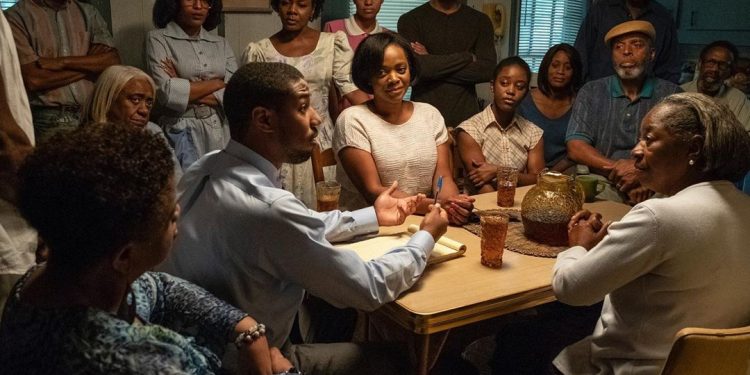Just Mercy is a biographical legal drama that traces the work experiences of Bryan Stevenson (played by Michael B Jordan), a Harvard-trained attorney who has dedicated his life to providing legal assistance to criminals on death row. The film encapsulates Stevenson’s work mainly through the case of Walter McMillian (played by Jamie Foxx), a black man wrongfully convicted of the murder of an 18-year old white girl, Ronda Morrison.
The film opens in Monroe County, Alabama, showing Walter McMillian — a pulpwood tree feller — who is apprehended by police. The next scene shows a young Bryan Stevenson visiting a death row inmate as part of his internship to inform the latter that he is not due for execution anytime soon. The inmate’s reaction — shedding tears of joy — is a defining moment for Stevenson, who then becomes inspired to provide legal assistance to those who are unable to afford it.
After obtaining his law degree, Stevenson travels to Alabama to provide legal assistance to poor people who are unable to afford proper legal representation. Through his meetings with inmates, we are shown that a disproportionate number of them are African American — reflective of a disturbing trend in prison populations in the United States, even today.
By the time Stevenson and McMillian cross paths, the latter is awaiting execution with little hope of reprieve, and has long become cynical towards attorneys who claim to be able to help. Determined to take on McMillian’s case, Stevenson demonstrates his determination by travelling to the outskirts of town to meet McMillian’s friends and family, who vehemently insist that he is innocent.
The journey to prove McMillian’s innocence involves Stevenson interacting with members of law enforcement, who are outraged at his attempts to overturn the court’s decision. Stevenson is also frustrated at the blatant lack of legal provisions that were made for Mcmillian during his trial — a common reality for many poor African American inmates.
The film also introduces us to McMillian’s neighbours on death row, whom Stevenson has also offered to help. We are introduced to Herbert Richardson (played by Rob Morgan), a veteran who suffers from post-traumatic stress disorder, and accused of capital murder after a bomb he constructed accidentally kills a young girl.
Despite being an attorney, Stevenson also finds himself at the mercy of bigoted white folk. He too, is stopped by the police while driving late at night, and is forced to be strip-searched at the prison before a legal visit. The poignant depiction of Stevenson’s discomfort at the officer’s behaviour and clear abuse of power is a powerful reminder of how one’s skin colour is a large determinant of how one is treated, regardless of status.
Although Stevenson manages to present evidence to prove Richardson’s preexisting mental health condition, the appeal is ultimately rejected by the court, and the latter’s execution day is set. One of the most heart-wrenching scenes in the movie — before Richardson awaits his execution by electric chair, he has a moment with Stevenson and wants to give his veteran flag to him because he has no one else to give it to. The simple scene sheds light on the grim reality on many death row prisoners, who have no one by their side as they face their last moments.
Richardson’s execution is traumatising for Stevenson, who then becomes even more determined to prevent McMillian from suffering a similar fate. He visits one of the key witnesses in McMillian’s case, convicted felon Ralph Myers, who was previously coerced to provide false testimony in exchange for a lighter sentence in his own trial. Stevenson also garners public support for McMillian’s release by bringing McMillian’s case to 60 Minutes, a famous investigative series on television. At the same time, Stevenson also appeals to the Supreme Court of Alabama to grant McMillian a retrial. After a retrial is granted, Stevenson files a motion to have all charges against McMillian dismissed, much to the displeasure of prosecutor Tommy Chapman (played by Rafe Spall), who maintains that keeping McMillian on death row is for the benefit of Monroeville’s citizens.
In a twist of events, Chapman also decides to join the motion to dismiss all charges against McMillian, hence allowing for the latter’s release from prison. McMillian, upon hearing the news, has an emotional breakdown in court, and is immediately surrounded by his overjoyed family and friends.
Despite a happy ending for McMillian, the end of the film shows Stevenson and McMillian advocating for equal justice, which reminds the audience that there are still countless of African Americans who are wrongfully incarcerated, or face much longer jail terms because of the inherent racism in the American judicial system.
Despite being set in the 1980s and 1990s, Just Mercy is a film that powerfully illustrates some of the struggles that African Americans have to contend with because of institutionalised racism. Its release is also timely in light of the Black Lives Matter movement that has erupted across the United States, calling for an end to institutional racism and police brutality towards people of colour. The film’s focus on the pain and struggles of the characters — although limited and brief — as they deal with repercussions of incarceration and capital punishment are pressing reminders for the audience that much still needs to be done to achieve equal justice for all.















